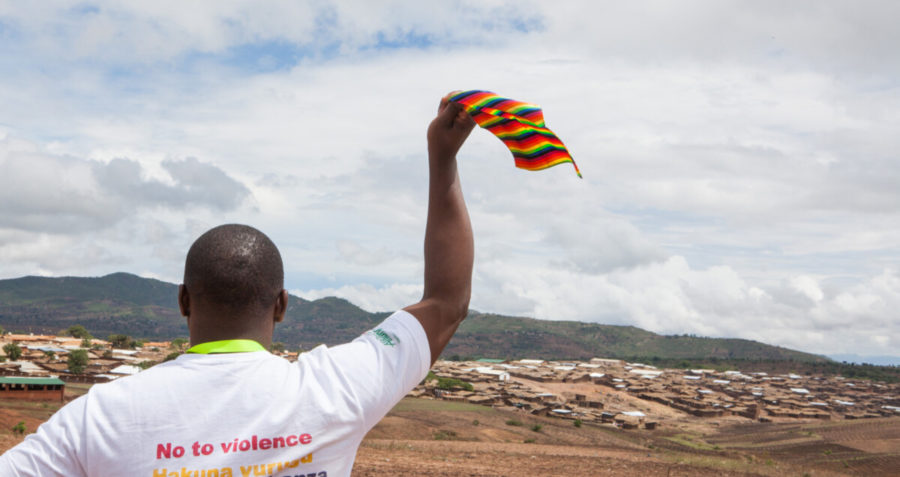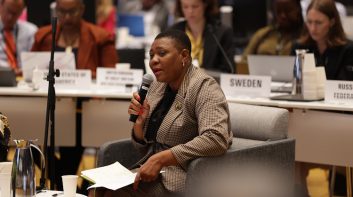Male sex workers and the fight for their lives in Malawi
 © Frontline AIDS/Gemma Taylor 2018
© Frontline AIDS/Gemma Taylor 2018
Men who have sex with men and who are also sex workers face a double stigma. Aniz Mitha knows exactly what this means, because he’s lived it first-hand.
“We become sex workers not because we are failures but because circumstances led us to,” says Aniz Mitha, executive director of Community Health Rights Advocacy (CHeRA), an organisation working with male sex workers in Malawi.
“People should consider us as human beings,” he continues. “We are all one, we are equal, we have our rights. Sex workers can be their sons, they can be their mothers, they can be their sisters, they can be their brothers, so they must see us as we are.
“I was disowned at a very tender age so I had to fend for myself. I had to go to South Africa where I became a sex worker. Then during my stay in South Africa I felt that I can do more if I go back home because I felt like each and every day in my country people were being abused, people were being disowned.”
Threatened with torture
According to UNAIDS data from 2017, globally nearly one in five men who have sex with men are living with HIV, which means prevalence is twice as high as in the rest of the adult male population. Despite the considerable progress that Malawi has made in controlling its HIV epidemic in recent years, it still has one of the highest prevalence in the world. Same-sex sexual relations are illegal and sex work is criminalised, and it’s this punitive environment, along with the accompanying stigma, that is a key driver of the epidemic among male sex workers.
Horrific accounts of violence are commonplace among the male sex worker community that CHeRA supports. Hastings* is an openly gay man who began working in the sex industry nine years ago when he was forced to leave school at age 17.
He says: “I was dismissed after being caught kissing with my friend who was a guy. I was feeling that maybe I was not fit to go to school because people were mocking me after they caught me so I just decided to leave school. It was so bad.”
Abused and abandoned
Disowned by his parents, and with no income, he turned to sex work but the local community in Blantyre also rejected him. “They can’t accept us,” he says, “because most of the work is done at night and sex workers like me, we always do our thing in hiding places.”
One night, Hastings was leaving a bar in Ndirande, Blantyre’s slum area, when he was confronted by a gang of seven men who accused him of trying to initiate one of their young relatives into homosexuality. They beat him mercilessly before casting him aside in a sewer. He ran to a friend’s house but the gang caught up with him, breaking down the door and resuming their assault on Hastings and his friend. When the gang finally retreated, they did so threatening to return to burn them alive.
Looking back isn’t easy. “I was feeling like maybe I’ve been abandoned everywhere because everyone, the community, was talking about me,” he says. “That’s when I contacted CHeRA about my situation.”
Rapid Response Fund grant
Aniz takes up the story of how CHeRA became involved and why the organisation applied to Frontline AIDS for a Rapid Response Fund emergency grant to help Hastings in his hour of need. “His case was genuine,” he says. “He did nothing wrong to provoke anyone, he was only trying to be authentic, he was trying to be himself but his life was at risk.”
The grant enabled Hastings to relocate to a safe house in Lilongwe where he received medical treatment and counselling. “This helped me a lot,” says Hastings, “because at least now I have started forgetting what happened in the past.”
But CHeRA’s support didn’t stop there. Aniz says: “We saw some potential in him that he could be a peer educator. We trained him and now he’s an outreach worker in charge of a whole Lilongwe district that he’s watching over.”
Addressing barriers to sexual health services
In the six districts where CHeRA works, there are more than 2,300 male sex workers that the organisation is reaching out to. Peer workers distribute condoms and lubricant, and help link those living with HIV to care and treatment. “Sex work is still condemned,” says Aniz, “so we use the public health approach as our entry point, that’s how we’re managing in this harsh environment.
“It’s very hard, because the healthcare workers who are not trained refuse us services, they humiliate us, even try to convert us to Christianity with promises of cures. So we tend not to go the public health service providers because we are afraid that the nurses will call the cops. There are a lot of structural barriers that we need to address so that we can access these services.”
Hastings is determined to make something positive come out of his terrible ordeal. “At first I was someone with no knowledge of human rights,” he says. “CHeRA helped me, they trained me. I can provide my friends with advice on HIV and health after everything that I’ve gone through. Now I’m happy, at least now life is better than before.
“I see myself being an activist, fighting for people’s lives, especially our key population community, because I also belong in that group. In ten years’ time, I will be a powerful activist so that we can change something here in Malawi.”
About our Fund
Community Health Rights Advocacy has been assisted by a grant from the Rapid Response Fund, which is managed by Frontline AIDS and funded by the Elton John AIDS Foundation. The Fund makes grants to LGBT and MSM organisations so that they can carry out urgent work to alleviate the stigma, discrimination and violence that threaten provision, access and uptake of HIV services for MSM and LGBT people.
*name changed
Further Reading
Tags
Gender-based violenceHIV preventionHIV treatmentLGBTRapid Response FundSex workStigma and discrimination





